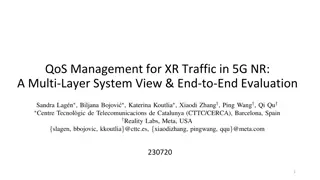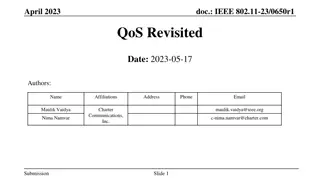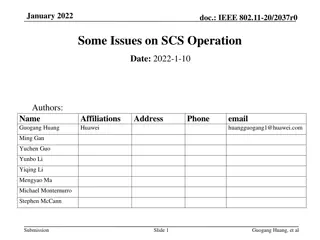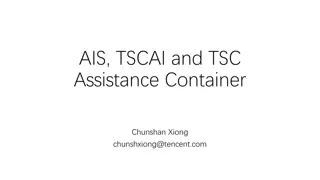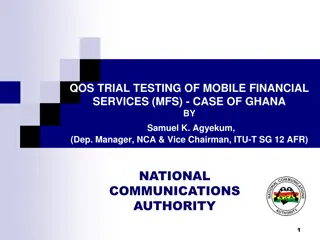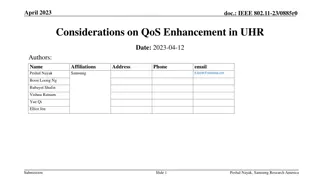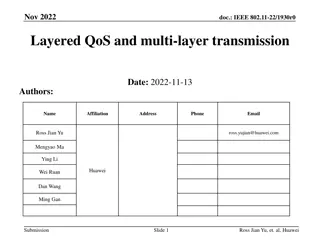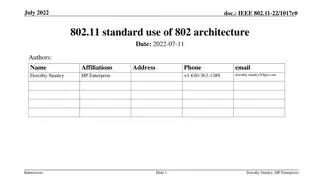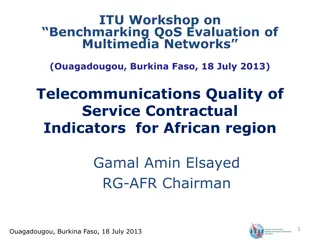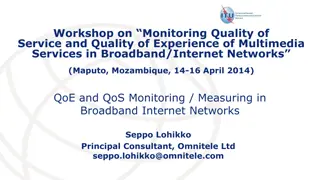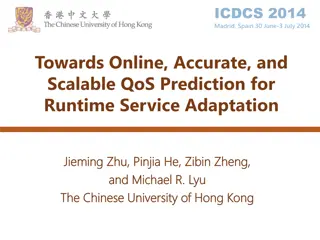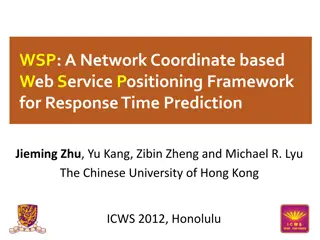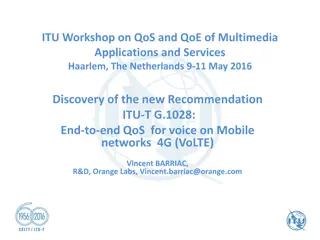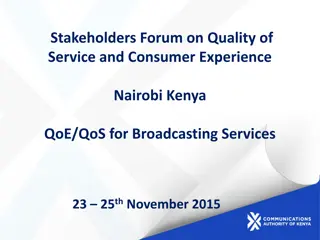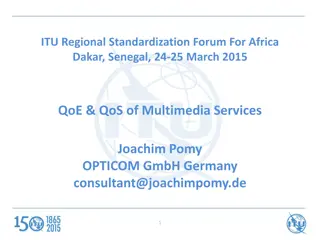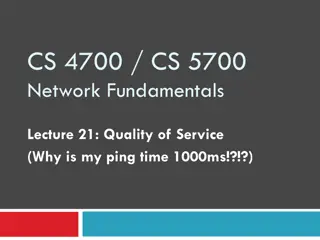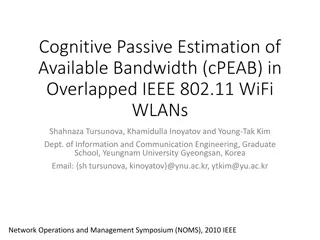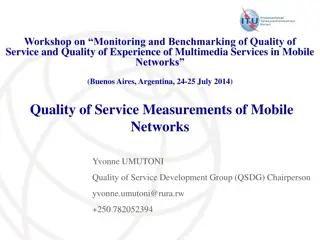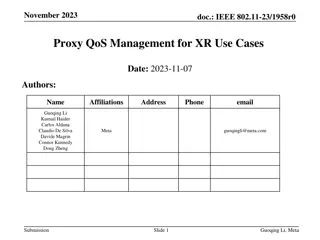Actions Emanating from the Evaluation of the Governance Reform
The evaluation of the governance reform within the WMO aimed to assess its alignment with strategic objectives, effectiveness in responding to societal needs, coordination efficiency, decision-making process, agility, and more. Evaluation criteria included relevance, design validity, effectiveness,
1 views • 13 slides
5G NR Traffic QoS Management: Multi-Layer System View & End-to-End Evaluation
5G NR technology emphasizes enhanced QoS for XR traffic, including AR, VR, and Cloud Gaming. This research delves into handling QoS for XR/CG traffic at various layers, proposing QoS control mechanisms at the application and MAC layers, along with an evaluation of these approaches using a simulator.
6 views • 14 slides
Enhancing QoS Facility for Low-Latency High-Throughput Performance in IEEE 802.11 Networks
This proposal addresses the shortcomings in traffic classification and handling of uplink/downlink traffic in current IEEE 802.11 specifications, particularly in relation to low-latency traffic. It also highlights issues with the current EDCA mode in managing congestion and proposes high-level solut
5 views • 18 slides
Comprehensive School Quality Assurance and Evaluation Process
A detailed insight into the Quality Assurance Department's role in school evaluation and improvement processes, including Whole School Evaluation (WSE), Follow-through initiatives, Teaching and Learning assessments, Resumption and Examination Monitoring. The process involves both internal self-evalu
0 views • 20 slides
Methods of Training Evaluation: Overview and Importance
Training and development are fast-growing fields globally, including in India. Evaluation plays a crucial role in understanding the effectiveness and efficiency of training programs for human resource development. This presentation covers the concept of training, evaluation strategies, methods/model
0 views • 61 slides
Universal Evaluation Framework: Simplifying Evaluation Processes
This session introduces the Universal Evaluation Framework (UEF) developed for evaluating QAA Scotland Enhancement Themes. Participants learn key evaluation questions, evidence capture, and the Theory of Change to enhance evaluation confidence. The QAA Scotland Evaluation Odyssey details historical
2 views • 14 slides
Implementing Blind Evaluation Pilot in HORIZON EUROPE: Key Facts and Process
HORIZON EUROPE is conducting a pilot on Blind Evaluation in the 2023-2024 work program to address biases in the research and innovation evaluation process. The pilot aims to assess the feasibility of blind evaluations in ensuring fairness and mitigating potential biases towards well-known organizati
9 views • 9 slides
Strengthening National Evaluation Capacity in the Era of Sustainable Development Goals
The presentation by Vijayalakshmi Vadivelu at the National Evaluation Capacities Conference 2017 in Istanbul focused on the importance of strengthening national evaluation capacity in alignment with the Sustainable Development Goals (SDGs). The content covers the holistic approach to national evalua
3 views • 18 slides
Exploring Developmental Evaluation for Better Decision-Making
Delve into the realm of developmental evaluation, focusing on its purpose, principles, and application in practice. Understand how developmental evaluation emphasizes real-time data collection for informed decision-making in complex systems. Learn about key principles such as developmental purpose,
0 views • 25 slides
Evaluation Practices in Macedonia: What Works, What Doesn't
The comparison between the effectiveness of evaluation practices and the presence of formal institutions in Macedonia raises questions about the impact of institutional design on outcomes. While some countries with robust evaluation institutions fall short in practice, others lacking such structures
1 views • 7 slides
Issues with SCS Operation in IEEE 802.11be Standard
The document discusses technical issues related to the SCS (Spatial Channel Sharing) operation in the IEEE 802.11be standard. It highlights inconsistencies in the standard regarding parameterized QoS requirements, mixing of traffic streams with different QoS needs, and challenges in prioritizing SCS
0 views • 15 slides
Enhancing Evaluation Capabilities in Mongolia for Agenda 2030
The Mongolian Evaluation Network in collaboration with UNDP is working to integrate the 2030 Agenda into national strategies and plans, establish institutional coordination mechanisms, align budgets, and enhance data monitoring systems. Key stakeholders including government agencies, NGOs, and inter
0 views • 9 slides
Time Synchronization in Cloud Gaming Services
Cloud gaming services like AIS, TSCAI, and TSC Assistance Container play a crucial role in providing quality of service (QoS) to millions of users globally. The need for time synchronization in 5G networks, especially for industrial applications like AR/VR, is highlighted. Trusted AF entities can di
0 views • 4 slides
Understanding Demi-Regularity in Realist Evaluation
Realist Evaluation is a theory-driven approach focusing on understanding the context and mechanisms of action behind policies and interventions. This webinar explores the concept of demi-regularity in realist evaluation, its origins, and its application in analyzing complex evidence. Key aspects cov
1 views • 16 slides
Enhancing Network Performance with RoCE Technology
Remote Direct Memory Access (RDMA) benefits, RoCEv2 packet format, resilient RoCE feature progression, optimizing network performance with QoS, and RoCE congestion control convergence analysis are discussed in this proposal. RoCE technology offers low latency, high throughput, and efficient CPU usag
0 views • 19 slides
Understanding Evaluation in Education
Evaluation in education is a comprehensive term that encompasses measurement, testing, and qualitative examination of student behavior. It involves both quantitative and qualitative descriptions, along with value judgments. Differentiating from mere measurement, evaluation provides a deeper analysis
0 views • 28 slides
Quality of Service (QoS) Trial Testing of Mobile Financial Services in Ghana
The National Communications Authority in Ghana conducted a QoS trial testing exercise on mobile financial services to assess compliance with QoS targets and consumer protection readiness. The test methodology involved using the SIGOS Integrated Test Environment system for billing verification on mob
5 views • 12 slides
Enhancing Quality of Service in Ultra High Rate Wi-Fi Networks
This document explores the potential improvements in Quality of Service (QoS) for Ultra High Rate (UHR) Wi-Fi networks, focusing on the benefits of timing information sharing for traffic urgency assessment. It discusses areas such as increased reliability, lower latencies, improved manageability, an
0 views • 11 slides
Layered QoS and Multi-Layer Transmission in IEEE 802.11-22 for Enhanced WLAN Performance
The document discusses the importance of layered Quality of Service (QoS) and multi-layer transmission in meeting the high throughput and real-time requirements of metaverse applications over WLAN. It emphasizes the need for enhanced throughput, reliability, reduced latency, and improved power effic
0 views • 11 slides
IEEE Std. 802.11-22/1017r0 Overview and Architecture Presentation
This presentation by Dorothy Stanley from HP Enterprise delves into the utilization of IEEE Std. 802.11-2020 standards focusing on the IEEE Std. 802 overview and architecture. It covers topics such as the use of LLC, MAC address formats, QoS mechanisms, MSDU formats, and various MAC services and pro
0 views • 10 slides
Sustainable Evaluation Systems Workshop Summary
Workshop on Sustainable Evaluation Systems by Stephen Porter at the NEC Conference focused on defining evaluation systems, addressing their failures, and emphasizing the importance of quality, use, and networks in achieving sustainability. Participants engaged in activities such as bingo card introd
0 views • 38 slides
Strategic Management: Strategy Review and Evaluation
This chapter delves into the critical process of strategy review, evaluation, and control in strategic management. It covers the nature of strategy evaluation, effective evaluation systems, contingency planning, auditing, using computers for evaluation, and guidelines for effective strategic managem
1 views • 42 slides
Enhancing Contractual Parameters for Telecommunications Quality in Africa
Workshop in Ouagadougou focused on benchmarking QoS evaluation of multimedia networks, highlighting the importance of QoS, priority of contractual matters, inadequacy of E-803 for African region, and the role of regulators in customer rights. Suggestions included additional contractual parameters to
1 views • 18 slides
Enhancing Multimedia Services in Broadband Networks through QoE and QoS Monitoring
Explore the significance of Quality of Service (QoS) and Quality of Experience (QoE) monitoring in broadband internet networks, as discussed at a workshop in Maputo, Mozambique. Learn about Omnitele's approach to measuring end-user QoS and QoE, aiming to maximize customer experience and minimize net
0 views • 38 slides
Impact and Evaluation Toolkit for Churches and Christian Charities
This toolkit aims to equip churches and Christian charities engaged in small-scale social action projects to think about impact, measure impact, choose data tools, reflect on evaluation data, and use it effectively. It covers principles of evaluation, setting objectives, selecting indicators, storyt
0 views • 34 slides
Overview of Monitoring and Evaluation in the GEF
The Evaluation in the GEF and Training Module focuses on promoting accountability and learning within the Global Environment Facility (GEF) through monitoring and evaluation activities. The GEF Independent Evaluation Office plays a crucial role in assessing results, effectiveness, and performance of
0 views • 25 slides
Scalable QoS Prediction for Service Adaptation in Service-Based Applications
This study delves into the challenge of predicting Quality of Service (QoS) for runtime service adaptation in service-based applications. It explores collaborative filtering and adaptive matrix factorization techniques for accurate QoS prediction, aiming towards enhancing service resilience and redu
0 views • 29 slides
Developing an Evaluation Work Plan for Effective Program Assessment
This presentation by Amy D. Andrade from San Jose State University focuses on developing an Evaluation Work Plan to identify responsibilities and timelines. It covers topics such as Evaluation Coaching Support, Webinar Outlines, Logic Model, Inputs-Outputs-Outcomes, Two Approaches to Evaluation, Pro
0 views • 29 slides
Evaluation Synthesis in Changing Contexts: Enhancing Knowledge for Development Effectiveness
Evaluation synthesis is crucial for promoting learning, reflection, and decision-making in development work. This process involves bringing together diverse knowledge sources to generate strategic insights and facilitate wider use of evaluation findings. The Independent Office of Evaluation of IFAD
0 views • 20 slides
Network Coordinate-based Web Service Positioning Framework for Response Time Prediction
This paper presents the WSP framework, a network coordinate-based approach for predicting response times in web services. It explores the motivation behind web service composition, quality-of-service evaluation, and the challenges of QoS prediction. The WSP framework enables the selection of web ser
0 views • 30 slides
Evaluation of FME Zero Emission Neighbourhoods in Smart Cities
The mid-term evaluation process of FME Zero Emission Neighbourhoods in Smart Cities involves self-evaluation, partner evaluation, and panel evaluation. The procedure includes scientific review, evaluation by scholars, and innovation assessment. Key documents like self-reports, progress reports, and
1 views • 20 slides
Overview of Regular Evaluation 2017 Findings in Estonia
In the Regular Evaluation 2017, efforts were made to maximize the benefits of evaluation outcomes for various stakeholders in Estonia such as the state, society, and institutions. The evaluation focused on a range of actions including preparing legislation, finding experts, creating self-report form
0 views • 6 slides
Introduction to ITU-T G.1028: End-to-End QoS for VoLTE on 4G Networks
This overview covers the journey and development of ITU-T G.1028, focusing on end-to-end quality of service (QoS) for Voice over LTE (VoLTE) on 4G networks. It details the background, key milestones, essential elements of VoLTE services, optional mechanisms considered, QoS classifications, and call
0 views • 14 slides
Comprehensive Guide to Training Evaluation Methods
This detailed guide covers the aim of evaluation, evaluation methods, techniques of evaluation, types of evaluation (formative, process, outcome, impact), and the significance of formative and process evaluation in assessing training effectiveness. Learn about the key principles and practices involv
0 views • 45 slides
Evolution of QoS/QoE in Broadcasting Services
Consumers and regulators are driving the need for established Quality of Service (QoS) and Quality of Experience (QoE) standards in broadcasting services. Stakeholders in Nairobi discussed the importance of ensuring signal quality, video/audio performance, and transmission metrics to meet subscriber
0 views • 12 slides
Understanding Quality of Experience (QoE) and Quality of Service (QoS) for IPTV Services
Explore the concepts of QoE and QoS for IPTV services, including user requirements, important definitions, QoE dimensions, compression artifacts, and components affecting channel zapping time. Learn about clean audio, VoD trick modes, triple play services, and more in this informative collection.
0 views • 13 slides
Understanding Quality of Service (QoS) in Network Fundamentals
Network Fundamentals Lecture 21 delves into Quality of Service (QoS) in networking, addressing the importance of prioritizing certain types of traffic based on factors like application performance, traffic importance, and service levels. The lecture explores the challenges of sharing resources among
0 views • 29 slides
Cognitive Passive Estimation of Available Bandwidth in Overlapped IEEE 802.11 WiFi WLANs
Efficient bandwidth estimation is crucial for network management and QoS applications, with cognitive passive methods offering insights without additional traffic loads. This research explores the impact of control messaging overhead, network topology, channel usage, hidden/exposed terminals, and pa
0 views • 13 slides
Workshop on Monitoring and Benchmarking of Quality of Service and Quality of Experience in Mobile Networks
Presentation focusing on quality of service monitoring and enforcement in mobile networks from a regulatory viewpoint. Covers purposes of QoS regulations, requirements for regulators, auditing methods, and QoS parameters for mobile services.
0 views • 14 slides
Proxy QoS Management for XR Devices in IEEE 802.11-23/1958r0 - November 2023
This document discusses the challenges faced by XR devices in terms of size, thermal constraints, cost, and power limitations leading to the proposal of Proxy QoS Management to enhance Wi-Fi performance. The aim is to leverage TGbn devices for improving legacy devices' connectivity within a Wi-Fi ne
0 views • 6 slides

